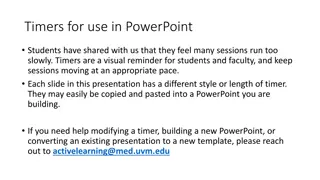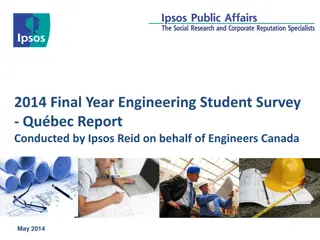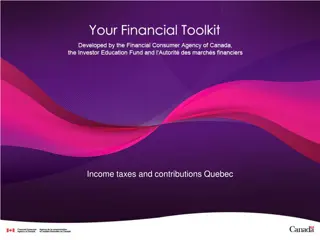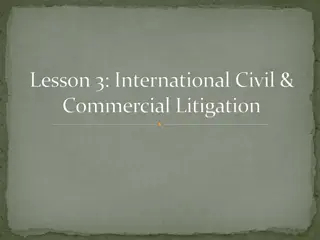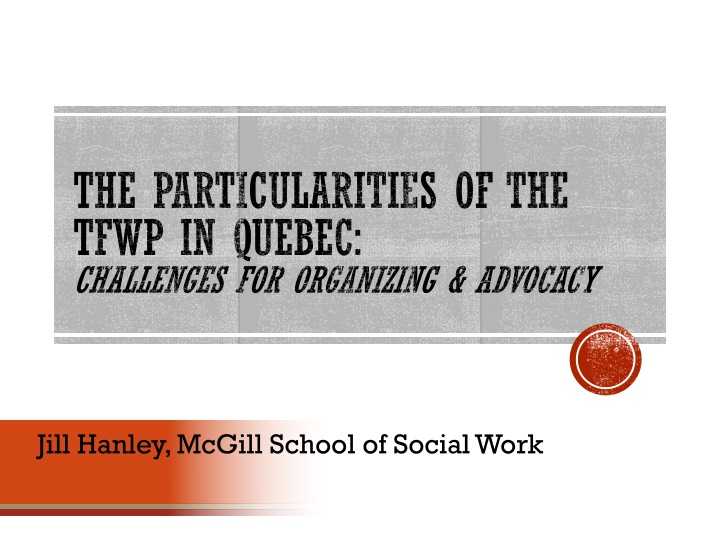
The Quebec TFWP Report: Challenges and Opportunities
Explore the unique aspects of the Temporary Foreign Worker Program (TFWP) in Quebec, including Quebec's powers in immigration, the use of TFWP in the province, statistics on work permits, and insights into agricultural workers and caregivers. Delve into the challenges faced in organizing and advocacy efforts, along with the prospects for future developments.
Download Presentation

Please find below an Image/Link to download the presentation.
The content on the website is provided AS IS for your information and personal use only. It may not be sold, licensed, or shared on other websites without obtaining consent from the author. If you encounter any issues during the download, it is possible that the publisher has removed the file from their server.
You are allowed to download the files provided on this website for personal or commercial use, subject to the condition that they are used lawfully. All files are the property of their respective owners.
The content on the website is provided AS IS for your information and personal use only. It may not be sold, licensed, or shared on other websites without obtaining consent from the author.
E N D
Presentation Transcript
THE PARTICULARITIES OF THE TFWP IN QUEBEC: CHALLENGES FOR ORGANIZING & ADVOCACY Jill Hanley, McGill School of Social Work
PRESENTATION Quebec s powers in immigration Use of the TFWP in the province Overview of specific streams of workers Access to permanent residency Challenges to organizing and advocacy Thoughts looking forward
QUEBECS POWERS OF IMMIGRATION Historical reasons for Quebec to demand control over immigration (since 1978) in order to provide Qu bec with new means to preserve its demographic importance in Canada, and to ensure the integration of immigrants in Qu bec in a manner that respects the distinct identity of Qu bec Select immigrants, control settlement services Very important political issue
USE OF THE TFWP IN QUEBEC TFWP outside of true provincial control: Employer-driven Province involved in LMIA approval & provides Quebec Acceptance Certificates Slow uptake of this program compared to other parts of the country Sector profile different fewer in service industry, fewer in low-wage urban No funding for migrant worker settlement
A FEW STATISTICS In 2016, 53 084 permanent residents (includes children) Number of work permits issued 2017 145 10,210 2,700 Live-In Caregivers Agricultural Workers Other Temporary Foreign Workers with LMIA Quebec Total 13,055 International Mobility Program: 27 865 Different profile of national origins
AGRICULTURAL WORKERS One of the few low-wage sectors that is growing Recruitment overwhelmingly by FERME Mix of Mexicans (SAWP) and Guatemalans (TFWP) No overtime pay, no right to unionize UPA has called for them to have access to permanent residency
CAREGIVERS Use of LCP declining dramatically in Quebec since early 2000s Presence of subsidized daycare, homecare services? Language issues? Other populations? In 2014, Quebec opted out of revised Caregiver program Instead, caregivers can come on regular TFWP program: advantages & disadvantages
LOW-WAGE WORKERS Uncommon in direct service industries More common in small-town industries: food transformation, light manufacturing Increasing calls from employers and municipalities for permanent residency Within bigger cities, seems to be in small groups or individually
HIGH-WAGE WORKERS Present in important industries: videogames, animation, pharmaceuticals, aerospace, education Again, disproportionate presence in smaller towns Little recognition of their vulnerabilities
INTERNATIONAL MOBILITY PROGRAMS Biggest group in Quebec Free-trade agreements, Working Holiday Visas (PVTistes) Very little oversight of their situation Again, little recognition of their vulnerabilities
PROTECTION OF SOCIAL RIGHTS Medicare for all TFWs & IMP with closed permits, 6 months or longer SAWP workers exempt from 3-month delay Many PVTistes in Qc covered by home countries (i.e. France) Full protection by Labour Standards & OHS, with few exceptions (not directly related to status) Agricultural workers excluded from overtime pay & from unionization Domestic workers excluded from Workers Compensation (but not preventive measures) As elsewhere, most significant challenges are risk of deportation, access & delays
ACCESS TO PERMANENT RESIDENCY Quebec Experience Class just opened to all categories!!! All NOC categories (previously up to C ) 12 months work in last 24 months on closed work permit Permanent job offer French Level 8**** We re waiting to see how this plays out in practice
CHALLENGES TO ORGANIZING & ADVOCACY Very few actors in the province doing direct service or organizing Activist organizations Community organizations Unions Difficult to identify workplaces, hours of travel No significant funding available from government or foundation sources
CHALLENGES, CONTD But status remains the number one barrier to rights, and to organizing Vulnerability to deportation Fear of not being renewed or called back Delays in process when seeking recourse Few alternatives for support if employment ends
WAYS FORWARD Open or sectoral work permits for TFWs Viable pathway to PR (limitations of current system) Removal of discriminatory exclusions from social rights Public funding for settlement services, d fense des droits and language classes Ultimately, improve our immigration program to remove the systemic barriers making people choose to come as migrant workers in the first place




